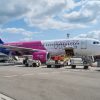 Despite a number of widely discussed tragedies, 2014 actually set a new record for the fewest number of commercial aviation accidents since the start of the airline age, with just 21 recorded. That’s down from 29 in 2013, 23 in 2012 and 36 in 2011. Nevertheless, the recent tragic events casted a shadow on some of the aviation safety related procedures, namely those concerning pilot mental health evaluation. It appears that even though hundreds of lives are in the hands of an aircraft pilot daily, it is pilots themselves that are responsible for assessing their own mental health.
Despite a number of widely discussed tragedies, 2014 actually set a new record for the fewest number of commercial aviation accidents since the start of the airline age, with just 21 recorded. That’s down from 29 in 2013, 23 in 2012 and 36 in 2011. Nevertheless, the recent tragic events casted a shadow on some of the aviation safety related procedures, namely those concerning pilot mental health evaluation. It appears that even though hundreds of lives are in the hands of an aircraft pilot daily, it is pilots themselves that are responsible for assessing their own mental health.
Despite the fact that commercial pilots are always mentioned among the most respectable and trusted professions, all eyes quickly turn to the person manning the aircraft in case of an accident. Not surprisingly, in order to ensure the utmost safety of the most popular way of travelling the world, airline pilots have to undergo a highly specific and extremely detailed training, which sometimes can exceed to years of learning and testing. Outstandingly, however, even in the line with FAA and EASA regulation, pilots around the globe are left on their own when it comes to monitoring something as important as their mental health.
“During the primary training, pilots are subject to thorough examination. However, the main focus usually remains on physical, not mental issues. Moreover, even though airlines  perform thorough background checks and seek reference letters, all of that is done only in the beginning of pilot’s career. Later on, yearly checks, containing couple of tick-boxes regarding mental illness is all that’s done to evaluate overall capability of an aircraft pilot, leaving him the sole authority to decide whether his mind is set for the job,” comments Skaiste Knyzaite, CEO of AviationCV.com. “Needless to say, keeping in mind that one of four people around the globe are affected by mental or neurological disorder according to World Health Organization, such an attitude rightfully becomes the reason for public concern.”
perform thorough background checks and seek reference letters, all of that is done only in the beginning of pilot’s career. Later on, yearly checks, containing couple of tick-boxes regarding mental illness is all that’s done to evaluate overall capability of an aircraft pilot, leaving him the sole authority to decide whether his mind is set for the job,” comments Skaiste Knyzaite, CEO of AviationCV.com. “Needless to say, keeping in mind that one of four people around the globe are affected by mental or neurological disorder according to World Health Organization, such an attitude rightfully becomes the reason for public concern.”
Although most of regional CAA’s are reviewing their relevant procedures in the light of recent tragic events, most of them state that the current practice of assessing mental health is sufficient. Moreover, they claim that no matter the changes, it is impossible to ensure that accidents caused by pilot’s mental stability are eliminated altogether.
In addition to that, even with tightening of the screening process, there is no potential way to eliminate pilot dishonesty. In fact, according to the rules of the FAA, pilots can be fined up to $250 000 if they try to falsify information or lie about their health. Despite that, clearly understanding that recognition of mental illness would definitely mean hurting ones career, it is not surprising many would be inclined to mention nothing that could raise suspicions.
“It is clear that strict regulations are not the answer. In the U.S. alone there are around 600 000 of licensed pilots, and conducting thorough personality checks for American pilots alone would consume 3.6 million hours and $1.8 billion at the midpoint of the price range. Keeping that in mind, airlines worldwide should instead opt to revise their HR strategies in terms of training, evaluation and recruitment process as a whole in order to minimize any possible loopholes in the system,” concludes Skaiste Knyzaite, CEO of AviationCV.com.





